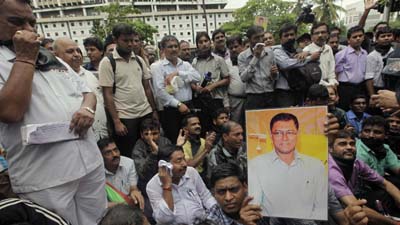In the comfort of my London home, far from the dangers of crime reporting in Mumbai, the news flash on television seemed unreal. Senior journalist Jyotirmoy Dey had been killed, pumped full of five bullets in broad daylight. I thought things like this only happened in Bollywood flicks, and that crime reporters in Mumbai never had any reason to jump at shadows. Alas, I was wrong.
It didn’t sink in until later, when my husband Danish and I sat up reminiscing on the days when we reported on Mumbai’s underbelly. J Dey (that’s what we always called him) was an editor at one of Mumbai’s leading newspapers, Midday. Danish remembers him as a guy who guarded his word, as any intelligent reporter covering the underworld and rogue police would do. He spoke little, kept his distance from the crowd, and protected his sources. He was a journalist par excellence.
A senior cop in Mumbai–one of the two I respect–once told me that J Dey probably knew more than the police about underworld operations, so I admired him before I even met him. When I did, I liked him instantly: He was a man of intelligence and maturity, always composed and dignified. Sachin Kalbag, Midday’s executive editor, remembers how J Dey was a “rock” when his colleague Akela was arrested under the draconian Official Secrets Act. Kalbag says J Dey never wavered for a minute and would often tell him, “We will get Akela out. You don’t worry. Remember, we are in the right; they (the police) are the bad guys here.”
J Dey’s death deserves our greatest condemnation.
Whatever the motive for J Dey’s murder, his profession played a huge part. Everyone is contemplating which of his stories angered someone enough to want to kill him. He was called the encyclopedia of the Mumbai underworld. His second book, Dial Zero, released a few months ago, explored the highly secretive issue of underworld informers. His contemporary Husain Zaidi, who also authored books on the Mumbai underworld, believes J Dey was writing a third book on the rags-to-riches stories of some underworld dons.
The brutality of J Dey’s murder has shocked everyone in the journalist fraternity in Mumbai and beyond. Hundreds of journalists are digging deep every day in the public interest to uncover crime. Will the killing set a precedent for anyone unhappy with the press to shoot journalists? Will fear lead to self-censorship?
As for the police, as crime reporters we know what happens behind closed doors in police stations. Many cops have been put behind bars thanks to investigative journalism. Abhishek Sharan, who worked with J Dey for several years, believes that nothing fascinated Dey more than the direct confrontation between the mafia and the police. His exposes and investigative stories have often upset the men in uniform. So far, no one has been arrested for his murder. The police have failed us yet again.
India ranks 13th on CPJ’s Impunity Index, highlighting the don’t-care-a-damn attitude of Indian authorities when it comes to investigating cases of slain journalists. But if I know the press in Mumbai; it will not let the cops sleep in peace until J Dey’s killers are brought to book. That’s the best tribute we can pay him.
